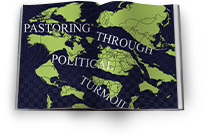Pastoring in Political Turmoil — A Perspective from Lebanon
My family and I moved to Lebanon four years ago with the hope of planting a church in Beirut. By God’s grace, we planted City Bible Church in the spring of 2018. Lebanon is a spectacular country with a rich history. Her beauty is even recorded in the Bible. But for several thousand years, she has been plagued with destruction and corruption.
Two weeks after we moved to Beirut, a new president was voted in, effectively ending a two-and-a-half-year stalemate in the country. An incredible sense of hope and pride filled the country. That feeling is all but gone.
In my time here, I’ve noticed how the tense and fragile political climate has directly affected Lebanon’s citizens and residents. During the Syrian refugee crisis, Lebanon had more refugees per capita than any other country in the world (one-in-four people were refugees). The country has been on the brink of war several times. Currently, Lebanon is experiencing an economic crisis unlike anything in her modern history.
Recent reports indicate that Lebanon is the first country in the MENA region to see its inflation rate exceed 50% for 30 consecutive days. The years of political corruption and lack of financial accountability since the Lebanese Civil War (1975–1990) has practically made Lebanon a failed state.
After months of increased prices on basic goods and the introduction of new taxes, Lebanese people hit the streets in protest. What’s now known as the Lebanese Revolution started on October 17, 2019. The majority of Lebanese people are calling for all the politicians to step down, and for a new government system to be established. Incredibly, the government has resigned twice since the start of the revolution. The first time was shortly after the revolution began; the second came a week after the Beirut explosion, the same one that blew up our church building.
The revolution has also deepened the difficult economic situation, though it’s in no way the cause of its current woes. The COVID-19 pandemic has crippled the economy even more than we previously experienced. And we’ve yet to see the effects that will follow the recent explosion and our now-empty parliament.
So, what does a young pastor in a new church plant do in a time like this? How much should a pastor speak into the political turmoil? Am I responsible to address the corruption that our church sees in every area of Lebanese life?
I certainly have more questions than I do answers. But I’ve found a few biblical principles that help me navigate and shepherd in these politically turbulent times.
1. Preach the Bible.
God’s word is living and active. It is powerful to save from sin and to break any bondage that’s found in this world. As ministers of the gospel, our duty and joy is to faithfully serve our church the eternal truths of Scripture. I know there’s a temptation to use our pulpits as a platform to address the issues of the week. But our people need the wisdom of God to endure such confusing times.
I’ve experienced such freedom and boldness to stand upon God’s Word, especially in these turbulent times. His Word has been an anchor to our congregation. He has been faithful to address not only our greatest need, but our present needs as well. I trust that the Holy Spirit will speak to his people through his Word, and this is the hope I hold onto every time I stand behind the pulpit.
2. Listen to your sheep.
So many voices and streams of information are available to us now that we sometimes think that we’re ready to speak to the church without ever taking time to listen to their actual concerns. Pastors, remember that what you see and read on social media often isn’t the reality and experience of your church members.
Taking time to listen to our members, especially on issues surrounding Lebanese politics, has greatly helped me shepherd the flock. I’ve found that I can bring these questions up during pastoral visits and in discipling conversations. Pastors must remember to listen to the voice of those God has given them to shepherd.
3. Highlight our shared identity in Christ.
Our union with Christ is the most important thing about us, even though we still struggle with the temptation to find our worth in other places. We desperately need to be reminded that, first and foremost, we’re those who have been saved by grace through faith. Any other ways we identify ourselves must fade to its proper place.
Diversity within the church is a gift from God. Of course Christians are ordinarily free to identify with a certain political party, or recognize themselves as part of a nationality or ethnic group. But our identity and union with Christ is greater than any other allegiance; it must override all others.
Pastors must declare this truth regularly because we’re often pressured to identify ourselves with something other than Christ. This is certainly the case in Lebanon. Every citizen’s personal record reflects their family religion, their patriarch’s hometown, and their political party (which is based on their religious identity). Where I live, family names and tribal alliances aren’t a thing of the past.
A clear understanding of our identity in Christ must shape how we interact with one another in the church. It should allow for both the grace and the space to dialogue with those who hold different social or political views.
4. Urge people to hope in God.
Though we know we should only set our hope in God, we’re still drawn to lesser saviors. In times of national elections and political turmoil, we need to keep our hope directed toward Christ.
Simply put, Christians must live differently than those in the world. Our hope must never be placed in a party, a politician, or a system of government. Our people need to be reminded to hope in God alone. We must teach them not to get swept up with the ambitious promises that come with every political season. Political dreams will fail, and if our people aren’t properly taught, those failed dreams will drive them to despair. We must hope in eternity because our citizenship is not of this world.
5. Remind them of the sovereignty of God.
The sovereignty of God is a source of assurance and hope in this broken world. When chaos and corruption abound, few truths are sweeter than “God is in control.”
Of course, trusting God’s sovereignty doesn’t take away the challenges of political turmoil. It’s difficult to understand why God would place certain earthly authorities in positions of power. In the midst of a revolution, it’s challenging to know how to lead the church to submit to the authorities placed over us when they are so evidently corrupt and wicked.
For instance, the recent Beirut explosion, which destroyed our building, was the result of gross negligence on the part of the government, even if it did happen by accident. The government had allowed dangerous materials to be stored near the middle of the city for years. As a result, thousands of homes and businesses have been destroyed. Over 220 people have died, thousands are injured, and hundreds of thousands are experiencing damage, loss, and trauma. Knowing that God is sovereign is our only peace in the midst of such destruction and brokenness.
There may be times when conscience and conviction won’t allow a person to submit to earthly authorities. And yet, as those who believe in God’s sovereignty, we know that in every way we submit here on earth we are ultimately submitting ourselves to God. If nothing else, this posture reminds us of our need for God. We must trust that all his providences are for his glory and our good.
6. Speak truth against sin.
Just as wars, sickness, and death show creation’s brokenness, contested elections, revolutions, and political turmoil do the same.
Pastors must speak against injustice and corruption because the church is founded on and committed to uphold truth. If we avoid calling out sin in social or cultural matters, then what right do we have to speak of sin in the lives of our flock? Surely, some political matters are unclear, and Scripture may not speak directly to it. But when sin is clear, and the opportunity is available, pastors are obliged to speak against it.
Anytime we discuss sin, we have a wonderful opportunity to declare the power of the gospel. Our church needs to hear each week that the gospel is able to save even the most corrupt and wicked politician. Our people need to be reminded that sin is our great enemy, and that in Jesus we have a great Savior.
Ultimately, pastoring our churches through political turmoil isn’t much different from pastoring them in any other season of life. Our sheep need to know that they are broken and that this world is broken. They need us to point them to Jesus. They need to repeatedly hear from God’s Word that our only hope, both in life and death, is that we are not our own but belong to God.









